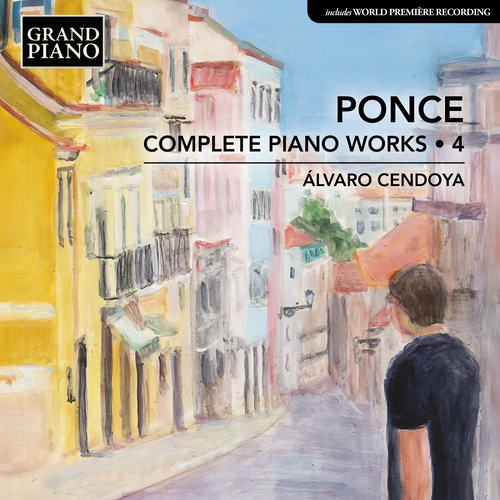
About this Release
Ponce, Manuel María (1882–1948)
Complete Piano Works • 4
- Álvaro Cendoya, piano
A fundamental characteristic of Manuel Ponce’s music is the range of styles and techniques he used throughout his career. The expressive Romanza de amor is a sublime example of his Romantic phase, while his huge contribution to Mexican nationalist music is represented in the folk music that appears in Rapsodia mexicana I and II. Moods of melancholy and nostalgia are evident in the Mazurkas as well as more modernist works such as the Intermezzo (No. 3). This is the fourth volume in Álvaro Cendoya’s critically acclaimed series of Ponce’s complete piano works.
Tracklist
|
1
Romanza de amor (1914) (00:04:09)
|
|
2
Rapsodia mexicana I (1911) (00:09:58)
|
|
3
Rapsodia mexicana II (1912) (00:09:47)
|
|
4
Arrulladora (1935) (00:02:01)
|
|
5
2 Danzas: No. 1. Mexicana, Danza romántica () (00:04:29)
|
|
6
El Riego (1908) (00:02:48)
|
|
7
Mazurka No. 16 in B-Flat Minor (1910) (00:03:09)
|
|
8
Mazurka No. 17 in E Minor (1913) (00:03:09)
|
|
9
Mazurka No. 18 (27) in E Minor (1917) (00:03:53)
|
|
10
Melodía (version for piano) (1900) (00:03:48)
|
|
11
Intermezzo [No. 3] (Glosario íntimo: IX. Alma triste) (1919) (00:02:43)
|
|
Trozos románticos (1911) (00:26:00 )
|
|
12
Cuaderno I: No. 1. Barcaroletta (00:01:12)
|
|
13
Cuaderno I: No. 2. Cuando viene la primavera (00:01:39)
|
|
14
Cuaderno II: No. 3. Souvenir (00:02:19)
|
|
15
Cuaderno II: No. 4. Malinconia (00:02:22)
|
|
16
Cuaderno III: No. 5. Quimera (00:02:04)
|
|
17
Cuaderno III: No. 6. Su primera mirada (00:01:03)
|
|
18
Cuaderno IV: No. 7. Berceuse (00:02:00)
|
|
19
Cuaderno IV: No. 8. A toi (00:02:04)
|
|
20
Cuaderno V: No. 9. Deseo (00:02:04)
|
|
21
Cuaderno V: No. 10. Hoja de álbum (00:03:21)
|
|
22
Cuaderno VI: No. 11. Petit prélude (00:01:14)
|
|
23
Cuaderno VI: No. 12. Jeunesse (00:01:16)
|
|
24
Cuaderno VII: No. 13. Página de álbum (00:00:53)
|
|
25
Cuaderno VII: No. 14. Scherzino (00:02:21)
|
The Artist(s)
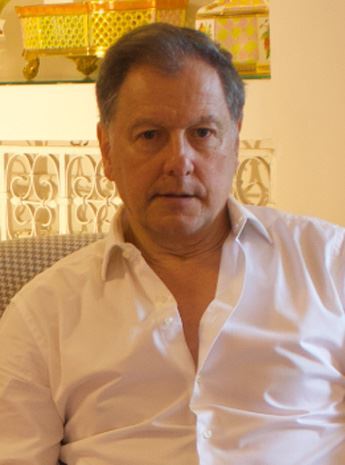 Álvaro Cendoya started his piano studies in his native Spain, followed by three years of studies in Buenos Aires, and later in London. In 1989 he won the prize for the best interpretation of Spanish music at the international Premio Jaén competition. He made international début in Geneva in 1995 and at Wigmore Hall a year later. Cendoya went on to give recitals and master classes around the world, including the UK, several European countries, the USA, across South America, in Iran, Beirut, Shanghai and Beijing. Previous recordings include music by Cuban composer Ignacio Cervantes and the Basque composer Garbizu. He is a professor at the Basque Conservatory of Music.
Álvaro Cendoya started his piano studies in his native Spain, followed by three years of studies in Buenos Aires, and later in London. In 1989 he won the prize for the best interpretation of Spanish music at the international Premio Jaén competition. He made international début in Geneva in 1995 and at Wigmore Hall a year later. Cendoya went on to give recitals and master classes around the world, including the UK, several European countries, the USA, across South America, in Iran, Beirut, Shanghai and Beijing. Previous recordings include music by Cuban composer Ignacio Cervantes and the Basque composer Garbizu. He is a professor at the Basque Conservatory of Music. The Composer(s)
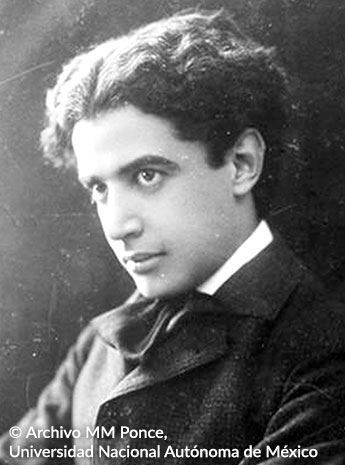 Manuel María Ponce was the author of a substantial and significant body of work and, as one of Mexico’s most prolific and well-known composers, is still held in great esteem today. His catalogue takes in virtually all genres and forms of music. One fundamental characteristic of his work is the use he made throughout his career of different styles, reflecting his range of knowledge and mastery of different compositional techniques. Broadly speaking, his music ranges from the post-Romanticism of the previous generation of composers to a modernism which made sporadic appearances in his early works but really began to establish itself in the music he wrote during his time in Paris (1925–33) and thereafter.
Manuel María Ponce was the author of a substantial and significant body of work and, as one of Mexico’s most prolific and well-known composers, is still held in great esteem today. His catalogue takes in virtually all genres and forms of music. One fundamental characteristic of his work is the use he made throughout his career of different styles, reflecting his range of knowledge and mastery of different compositional techniques. Broadly speaking, his music ranges from the post-Romanticism of the previous generation of composers to a modernism which made sporadic appearances in his early works but really began to establish itself in the music he wrote during his time in Paris (1925–33) and thereafter. Reviews

“The two major works here are the Mexican Rhapsodies, each nearly 10 minutes long and with a vigorous theme of Mexican origin. They require considerable virtuosity and are somewhat grandiose but compelling. My enthusiasm for this release extends to Alvaro Cendoya’s superb playing. I look forward to Volume 5.” – American Record Guide

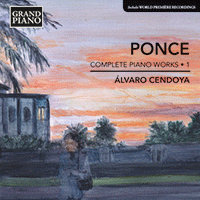
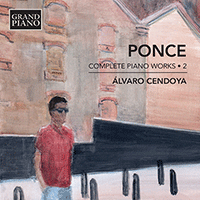
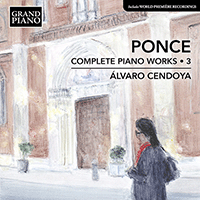
 Grand Piano has gained a reputation for producing high quality recordings of rare keyboard gems. Dedicated to the exploration of undiscovered piano repertoire, the label specialises in complete cycles of piano works by many lesser-known composers, whose output might otherwise have remained unknown and unrecorded.
Grand Piano has gained a reputation for producing high quality recordings of rare keyboard gems. Dedicated to the exploration of undiscovered piano repertoire, the label specialises in complete cycles of piano works by many lesser-known composers, whose output might otherwise have remained unknown and unrecorded.






